第七whenwhileas区别及练习
- 格式:pdf
- 大小:58.68 KB
- 文档页数:3
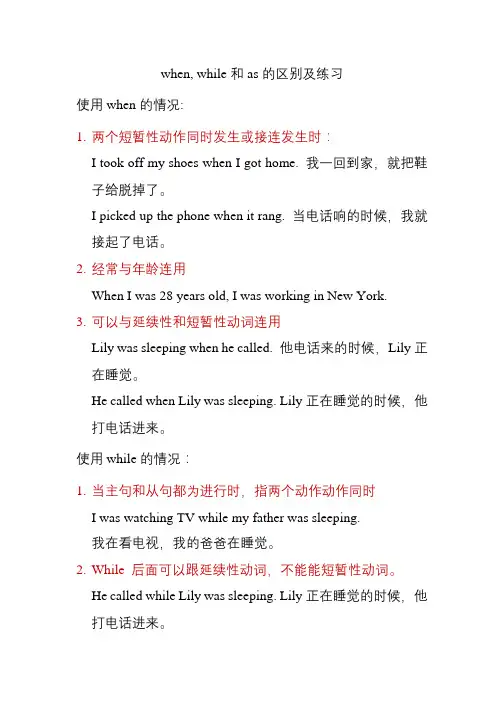
when, while和as的区别及练习使用when的情况:1.两个短暂性动作同时发生或接连发生时:I took off my shoes when I got home. 我一回到家,就把鞋子给脱掉了。
I picked up the phone when it rang. 当电话响的时候,我就接起了电话。
2.经常与年龄连用When I was 28 years old, I was working in New York.3.可以与延续性和短暂性动词连用Lily was sleeping when he called. 他电话来的时候,Lily正在睡觉。
He called when Lily was sleeping. Lily正在睡觉的时候,他打电话进来。
使用while的情况:1.当主句和从句都为进行时,指两个动作动作同时I was watching TV while my father was sleeping.我在看电视,我的爸爸在睡觉。
2.While 后面可以跟延续性动词,不能能短暂性动词。
He called while Lily was sleeping. Lily正在睡觉的时候,他打电话进来。
3.while 还可以表示然而,但是He is clever while he is very lazy. 他很聪明,但是很懒。
使用as的情况:1.As后面跟延续性动词He went back as his mother was cooking. 当他妈妈正在煮饭的时候,他回来了。
2.As 可以引导让步状语从句,但要倒装Child as he is, he is popular with a lot of people. 尽管他是小孩,但是他受很多人的欢迎与喜爱。
Try as he might, he still couldn’t make progress. 尽管他也尝试了,但是他仍然没有获得进步。
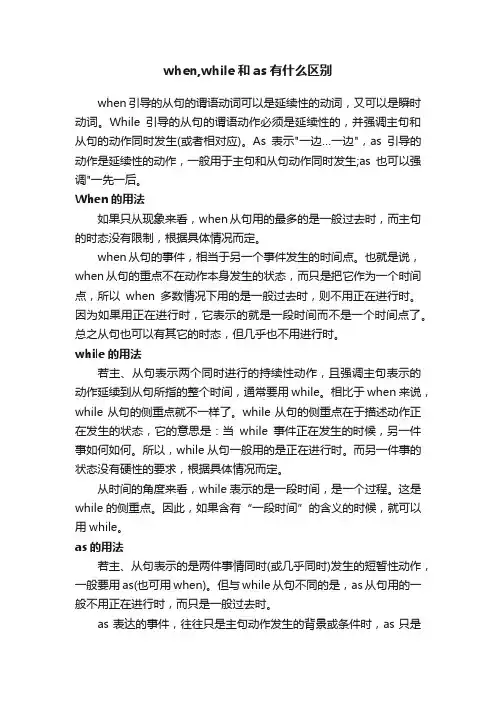
when,while和as有什么区别when引导的从句的谓语动词可以是延续性的动词,又可以是瞬时动词。
While引导的从句的谓语动作必须是延续性的,并强调主句和从句的动作同时发生(或者相对应)。
As表示"一边…一边",as引导的动作是延续性的动作,一般用于主句和从句动作同时发生;as也可以强调"一先一后。
When的用法如果只从现象来看,when从句用的最多的是一般过去时,而主句的时态没有限制,根据具体情况而定。
when从句的事件,相当于另一个事件发生的时间点。
也就是说,when从句的重点不在动作本身发生的状态,而只是把它作为一个时间点,所以when多数情况下用的是一般过去时,则不用正在进行时。
因为如果用正在进行时,它表示的就是一段时间而不是一个时间点了。
总之从句也可以有其它的时态,但几乎也不用进行时。
while的用法若主、从句表示两个同时进行的持续性动作,且强调主句表示的动作延续到从句所指的整个时间,通常要用while。
相比于when来说,while从句的侧重点就不一样了。
while从句的侧重点在于描述动作正在发生的状态,它的意思是:当while事件正在发生的时候,另一件事如何如何。
所以,while从句一般用的是正在进行时。
而另一件事的状态没有硬性的要求,根据具体情况而定。
从时间的角度来看,while表示的是一段时间,是一个过程。
这是while的侧重点。
因此,如果含有“一段时间”的含义的时候,就可以用while。
as的用法若主、从句表示的是两件事情同时(或几乎同时)发生的短暂性动作,一般要用as(也可用when)。
但与while从句不同的是,as从句用的一般不用正在进行时,而只是一般过去时。
as表达的事件,往往只是主句动作发生的背景或条件时,as只是一个次要的时间说明,不像while从句有强调while动作本身的意思。
因此,as常常翻译成“随着……”之意。
when,while和as的区别1.根据从句动作的持续性来区分若是“主短从长”型,即主句是一个短暂性的动作,而从句是一个持续性动作,此时三者都可用。
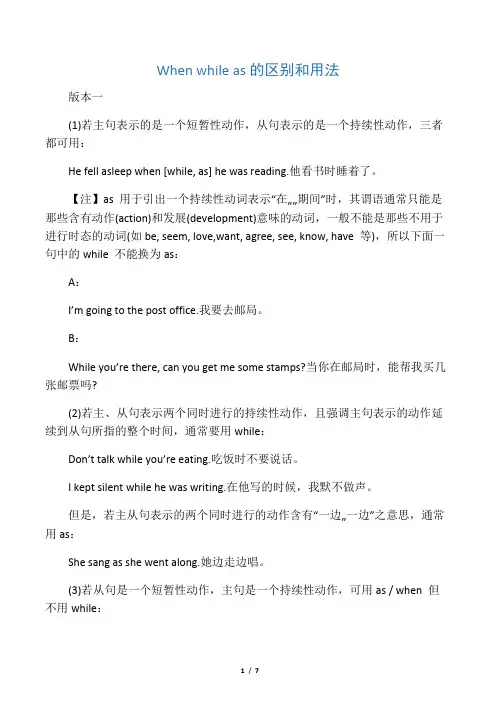
When while as的区别和用法版本一(1)若主句表示的是一个短暂性动作,从句表示的是一个持续性动作,三者都可用:He fell asleep when [while, as] he was reading.他看书时睡着了。
【注】as 用于引出一个持续性动词表示“在……期间”时,其谓语通常只能是那些含有动作(action)和发展(development)意味的动词,一般不能是那些不用于进行时态的动词(如be, seem, love,want, agree, see, know, have 等),所以下面一句中的while 不能换为as:A:I’m going to the post office.我要去邮局。
B:While you’re there, can you get me some stamps?当你在邮局时,能帮我买几张邮票吗?(2)若主、从句表示两个同时进行的持续性动作,且强调主句表示的动作延续到从句所指的整个时间,通常要用while:Don’t talk while you’re eating.吃饭时不要说话。
I kept silent while he was writing.在他写的时候,我默不做声。
但是,若主从句表示的两个同时进行的动作含有“一边…一边”之意思,通常用as:She sang as she went along.她边走边唱。
(3)若从句是一个短暂性动作,主句是一个持续性动作,可用as / when 但不用while:It was raing hard when [as] we arrived.我们到达时正下着大雨。
(4)若主从句表示的是两个同时(或几乎同时)发生的短暂性动作,用as / when:I thought of it just when [as] you opened your mouth.就在你要说的时候,我也想到了。
(5)若要表示两个正在发展变化的情况,相当于汉语的“随着”,一般用as:Things are getting better and better as time goes on.随着时间的推移,情况越来越好。
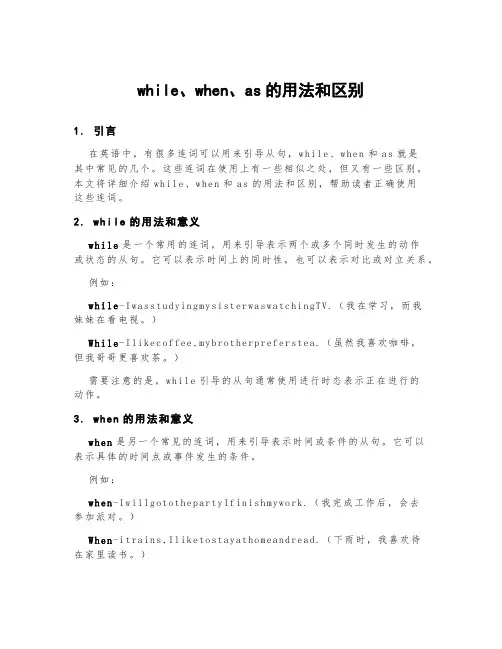
while、when、as的用法和区别1.引言在英语中,有很多连词可以用来引导从句,w hi le、w he n和as就是其中常见的几个。
这些连词在使用上有一些相似之处,但又有一些区别。
本文将详细介绍w hil e、w he n和as的用法和区别,帮助读者正确使用这些连词。
2. wh ile的用法和意义w h i l e是一个常用的连词,用来引导表示两个或多个同时发生的动作或状态的从句。
它可以表示时间上的同时性,也可以表示对比或对立关系。
例如:w h i l e-I wa s st ud yin g my si st er wa sw atc h in gT V.(我在学习,而我妹妹在看电视。
)W h i l e-I li k ec of fee,my br ot he rp re fer s te a.(虽然我喜欢咖啡,但我哥哥更喜欢茶。
)需要注意的是,w hil e引导的从句通常使用进行时态表示正在进行的动作。
3. wh en的用法和意义w h e n是另一个常见的连词,用来引导表示时间或条件的从句。
它可以表示具体的时间点或事件发生的条件。
例如:w h e n-Iw il lg ot ot he p ar ty If in is hm ywo r k.(我完成工作后,会去参加派对。
)W h e n-it ra in s,Il ik e to st ay at ho me and r ea d.(下雨时,我喜欢待在家里读书。
)与w hi le不同的是,w he n引导的从句通常使用一般时态表示一般性的情况。
4. a s的用法和意义a s是一个多功能的连词,它可以表示时间、原因、方式等多种含义。
具体用法如下:-表示时间:当某个动作在另一个动作发生时进行。
例如:A s-Iw as wa lk in gd ow n th es tr ee t,Is awa n ol df ri en d.(当我走在街上时,我碰见了一个老朋友。
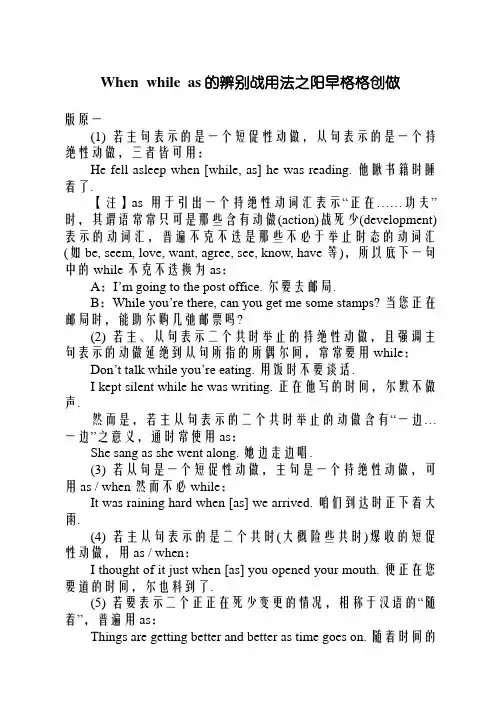
When while as的辨别战用法之阳早格格创做版原一(1) 若主句表示的是一个短促性动做,从句表示的是一个持绝性动做,三者皆可用:He fell asleep when [while, as] he was reading. 他瞅书籍时睡着了.【注】as 用于引出一个持绝性动词汇表示“正在……功夫”时,其谓语常常只可是那些含有动做(action)战死少(development) 表示的动词汇,普遍不克不迭是那些不必于举止时态的动词汇(如 be, seem, love, want, agree, see, know, have 等),所以底下一句中的 while 不克不迭换为 as:A:I’m going to the post office. 尔要去邮局.B:While you’re there, can you get me some stamps? 当您正在邮局时,能助尔购几弛邮票吗?(2) 若主、从句表示二个共时举止的持绝性动做,且强调主句表示的动做延绝到从句所指的所偶尔间,常常要用 while:Don’t talk while you’re eating. 用饭时不要谈话.I kept silent while he was writing. 正在他写的时间,尔默不做声.然而是,若主从句表示的二个共时举止的动做含有“一边…一边”之意义,通时常使用 as:She sang as she went along. 她边走边唱.(3) 若从句是一个短促性动做,主句是一个持绝性动做,可用 as / when 然而不必 while:It was raining hard when [as] we arrived. 咱们到达时正下着大雨.(4) 若主从句表示的是二个共时(大概险些共时)爆收的短促性动做,用 as / when:I thought of it just when [as] you opened your mouth. 便正在您要道的时间,尔也料到了.(5) 若要表示二个正正在死少变更的情况,相称于汉语的“随着”,普遍用 as:Things are getting better and better as time goes on. 随着时间的推移,情况越去越佳.As it grew darker, it became colder. 天色越早,天气越热.(6) 表示“每当…的时间”(表示一种程序性),普遍要用when:It’s cold when it snows. 下雪时天热.He smiles when you praise him. 您夸奖他时他经常笑笑.(7) 若主从句所表示的动做不是共时爆收,而是有先后程序时,普遍要用 when:I will go home when he comes back. 他回去时,尔便回家去.(8) when 可用做并列连词汇,表示“那时(突然)”;while 也不妨用做并列连词汇,表示“而”、“却”(表示对于比);然而 as 则不类似用法:We were about to start when it began to rain. 咱们正要出收,那时天启初下雨了.He likes coffee, while she likes tea. 他喜欢咖啡,而她却喜欢茶.(9) as 战when 后均可曲交跟一个名词汇,形成简略句,然而 while 普遍不那样用:As [When] a boy, he lived in Japan. 他小时间正在日原.(10) when 战while 后可交当前分词汇、介词汇短语、形容词汇等形成简略句,然而 as 普遍不那样用:When [While] reading, he fell asleep. 他瞅书籍时睡着了.When [While] in trouble, ask her for help. 逢到贫苦的时间您便去找她帮手.版原二一、as的意义是“正当……时间(just as,at the same moment that)”“随着……(while,when)”,它既可表示一个简曲的时间面,也不妨表示一段时间.as可表示主句战从句的动做共时爆收大概共时持绝,即“面面沉合”“线线沉合”;又可表示一个动做爆收正在另一个动做的持绝历程中,即“面线沉合”,然而不克不迭表示二个动做一前一后爆收.如果主句战从句的谓语动词汇皆表示持绝性的动做,二者均可用举止时,也不妨一个用举止时,一个用普遍时大概者皆用普遍时.比方:1、As I got on the bus, he got off.尔上车,他下车.(面面沉合)2、 He was writing as I was reading.尔瞅书籍时,他正在写字.(线线沉合)3、 The students were talking as the teacher came in.教授进去时,教死们正正在道话.(面线沉合)二、while的意义是“正在……共时(at the same time that )”“正在……功夫(for as long as, during the time that)”.从while的自己词汇义去瞅,它只可表示一段时间,不克不迭表示简曲的时间面.正在时间上不妨是“线线沉合”大概“面线沉合”,然而不克不迭表示“面面沉合”.比方:1、He was watching TV while she was cooking.她干饭时,他正在瞅电视.(线线沉合)2、 He was waiting for me while I was working.尔处事的时间,他正等着尔.(线线沉合)3、 He asked me a question while I was speaking.尔正在道话时,他问了尔一个问题.(面线沉合)三、when的意义是“当……时间(at the time that)”“无论什么时间(whenever)”“一……便……(as soon as )”“正在……以去(after)”.它表示的时间观念比较广大,上述例句中的as大概while均可用when代替,果为when不但不妨表示简曲的时间面,而且也不妨表示一段时间.正在时间上它既能表示“面面沉合”“线线沉合”,又能表示“面线沉合”.比方:1、When he came in,she went out.他进去,她进去.(面面沉合)此句中when从句的动做表示的是一个时间面,when不妨用as代替,然而不克不迭用while代替.2、When he came back,I was doing some washing.他回去时,尔正在洗衣服.(面线沉合)此句中when从句的动做表示的是一个时间面,所以只可用as代替,不克不迭用while代替.3. When Mary was writing a letter, the children were playing outside.玛丽写疑时,孩子们皆正在表里玩.(线线沉合)此句中的when从句的动做表示的是一段时间,故可用as 大概 while代替.版原三一、根据从句动做的持绝性去区别1、“主短从少”型:即主句是一个短促性动做,而从句是一个持绝性动做,此时三者皆可用.如:Jim hurt his arm while[when, as] he was playing tennis. 凶姆挨网球时把脚臂扭伤了.As[When,While]she was waiting for the train,she became very impatient. 她正在等火车时,变得很不耐烦.注意:as 用于引出一个持绝性动词汇表示“正在……功夫”时,其谓语常常只可是那些含有动做(action)战死少(development)表示的动词汇,普遍不克不迭是那些不必于举止时态的动词汇(如be,seem,love,want,agree,see,know,have等),所以底下一句中的 while 不克不迭换为 as:A:I’m going to the post office. 尔要去邮局.B:While you are there, can you get me some stamps?当您正在邮局时,能助尔购几弛邮票吗?2、“主少从少”型:即主句战从句为二个共时举止的动做大概存留的状态,且强调主句动做大概状态延绝到从句所指的所偶尔间,此时常常要用while.I always listen to the radio while I’m driving. 尔经常一边启车一边听支音机.He didn’t ask me in; he kept me standing at the door while he re ad the message. 他不让尔进去,他只瞅瞅那弛条子,让尔站正在门心等着.然而是,若主句战从句所表示的二个共时举止的动做含有“一边……一边”之意时,则习惯上要用as.如:He swung his arms as he walked. 他走路时晃动收端臂.I couldn’t remember a story to tell the children, so I made one u p as I went along. 尔念不出有什么故事可给孩子道了,只佳现编现道.3、“主少从短”型:即主句是一个持绝性动做,而从句是一个短促性动做,此时不妨用as大概when,然而不克不迭用whil e.如:It was raining hard when [as] we arrived. 咱们到达时正下着大雨.When [As] he came in, I was listening to the radio. 他进去时,尔正在听支音机.二、根据主句取从句动做是可共时爆收去区别1、若主句取从句表示的是二个共时爆收的短促性动做,含有类似汉语“一……便”的意义,英语普遍要用as (也可用when).如:The ice cracked as [when] I stepped onto it. 尔一踏冰便裂了.He jumped to his feet as the boss came in. 老板一进去他坐刻站了起去.然而是,正在hardly [scarcely]…when…句式中,不克不迭将when换成as.如:Scarcely had we arrived, when it began to rain. 咱们刚刚一到便下起雨去了.2、若主句取从句表示的是二个险些共时爆收的短促性动做,含有类似汉语“刚刚要……便”“正要……却”的意义,英语普遍要用as 也可用when??,且此时常常连用副词汇just.如:I??caught??him??just??when??[as]??he??was??leaving??the??building ??他正要离启大楼的时间,尔把他截住了.Just??as??[when]??the??two??men??were??leaving??a??message??arri ved??便正在那二部分要离启的时间,突然有了消息.三、根据是可具备伴伴变更去区别若要表示主句动做伴伴从句动做共时死少变更,有类似汉语“随着”的意义,英语习惯上要用as,而不必when大概while.如:The room grew colder as the fire burnt down. 随着炉火渐渐减强,房间越去越热.As time goes by my memory seems to get worse. 随着时间的流逝,尔的影象力好像越去越好.注:若不是带领从句,而是引出一个短语,则用with,不必as.如:With winter coming on, it’s time to buy warm clothes. 随着冬天到去,该购温战衣裳了.The shadows lengthened with the approach of sunset. 随着太阳下降,影子也渐渐伸少.四、根据从句动做的程序性去区别若表示一种程序性,表示“每当……的时间”,英语普遍要用when.如:It’s cold when it snows. 下雪时天热.He smiles when you praise him. 您夸奖他时他经常笑笑.五、根据主从句动做的先后程序去区别若主句取从句所表示的动做不是共时爆收,而是有先后程序时,普遍要用when.如:When he arrives he’ll tell us all about the match. 等他到了,他会佳佳给咱们道道那场角逐的情况.When she had finished she waited as though for a reply. 她道完之后等了等,好像是正在期待回问似的.六、根据是可具备“趁机”表示去区别1、若从句所表示的“当……的时间”具备“趁机”的表示,则通时常使用while.如:Strike while the iron is hot. 趁热挨铁.I tried to slip the note to him while the teach er wasn’t looking. 尔念趁教授不注意时把条子悄悄递给他.偶尔也用when.如:He stole the money when no one was by. 他趁中间无人时把钱偷走了.The boy looks at her repeatedly when she’s not looking. 那男孩趁她出瞅他的时间不竭天盯着她瞅.七、根据是可用做并列连词汇去区别when可用做并列连词汇,表示“那时(突然)”;while也不妨用做并列连词汇,表示“而”“却”(表示对于比);然而as则不类似用法.如:I was just about to go to bed when I heard a knock on the door. 尔正要睡眠,听睹有人敲门.One person may like to spend his vacation at the seashore, while another may prefer the mountains. 一部分会喜欢正在海滨度假,而另一部分会喜欢正在山里度假.八、根据所引出的简略句去区别1、as战when之后均可曲交跟一个名词汇,形成简略句;然而是while普遍不那样用.如:As [When] a boy, he lived in Japan. 他小时间正在日原.As [When] still a student, he wrote a novel. 当他仍旧个教死的时间,他便写了一原小道.2、when战while之后可交当前分词汇、介词汇短语、形容词汇等形成简略句,然而as普遍不那样用.如:When [While] reading, he fell asleep. 他瞅书籍时睡着了.When [While] in trouble, ask her for help. 逢到贫苦的时间您便去找她帮手.You must study hard while (you are) young, or you will regret w hen (you are) old. 您趁年少时必须全力教习,可则到老了您会悔恨的.。
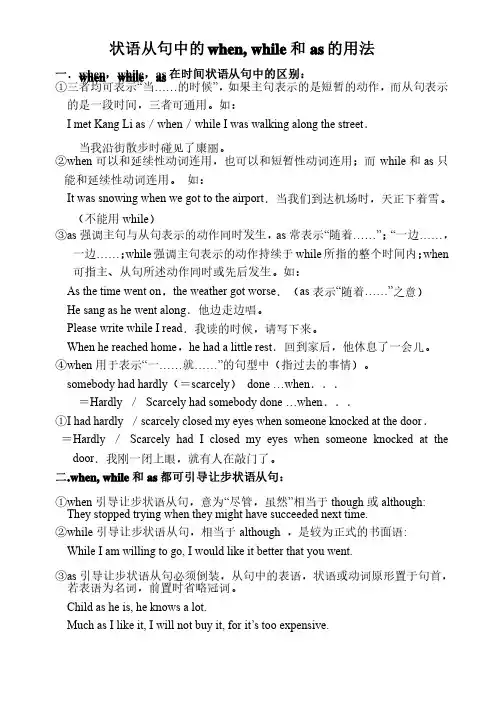
状语从句中的when, while 和as 的用法一.when ,while ,as 在时间状语从句中的区别: ①三者均可表示“当……的时候”,如果主句表示的是短暂的动作,如果主句表示的是短暂的动作,而从句表示而从句表示而从句表示 的是一段时间,三者可通用。
如:的是一段时间,三者可通用。
如:I met Kang Li as /when /while I was walking along the street .当我沿街散步时碰见了康丽。
当我沿街散步时碰见了康丽。
②when 可以和延续性动词连用,也可以和短暂性动词连用;而while 和as 只能和延续性动词连用。
能和延续性动词连用。
如:如:It was snowing when we got to the airport .当我们到达机场时,天正下着雪。
(不能用while )③as 强调主句与从句表示的动作同时发生,as 常表示“随着……”;“一边……,一边……;while 强调主句表示的动作持续于while 所指的整个时间内;when 可指主、从句所述动作同时或先后发生。
如:可指主、从句所述动作同时或先后发生。
如:As the time went on ,the weather got worse .(as 表示“随着……”之意)之意) He sang as he went along .他边走边唱。
.他边走边唱。
Please write while I read .我读的时候,请写下来。
.我读的时候,请写下来。
When he reached home ,he had a little rest .回到家后,他休息了一会儿。
.回到家后,他休息了一会儿。
④when 用于表示“一……就……”的句型中(指过去的事情)。
的句型中(指过去的事情)。
somebody had hardly (=scarcely ) done …when ......=Hardly / Scarcely had somebody done …when ......①I had hardly /scarcely closed my eyes when someone knocked at the door .=Hardly /Scarcely had I closed my eyes when someone knocked at the door .我刚一闭上眼,就有人在敲门了。
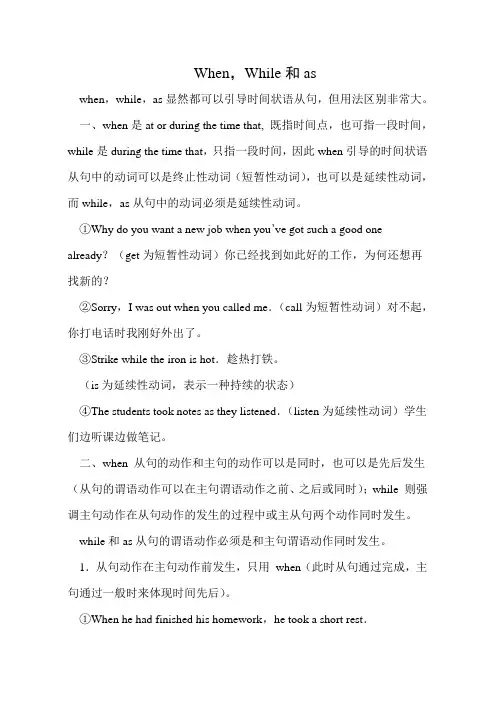
When,While和aswhen,while,as显然都可以引导时间状语从句,但用法区别非常大。
一、when是at or during the time that, 既指时间点,也可指一段时间,while是during the time that,只指一段时间,因此when引导的时间状语从句中的动词可以是终止性动词(短暂性动词),也可以是延续性动词,而while,as从句中的动词必须是延续性动词。
①Why do you want a new job when you’ve got such a good one already?(get为短暂性动词)你已经找到如此好的工作,为何还想再找新的?②Sorry,I was out when you called me.(call为短暂性动词)对不起,你打电话时我刚好外出了。
③Strike while the iron is hot.趁热打铁。
(is为延续性动词,表示一种持续的状态)④The students took notes as they listened.(listen为延续性动词)学生们边听课边做笔记。
二、when 从句的动作和主句的动作可以是同时,也可以是先后发生(从句的谓语动作可以在主句谓语动作之前、之后或同时);while 则强调主句动作在从句动作的发生的过程中或主从句两个动作同时发生。
while和as从句的谓语动作必须是和主句谓语动作同时发生。
1.从句动作在主句动作前发生,只用when(此时从句通过完成,主句通过一般时来体现时间先后)。
①When he had finished his homework,he took a short rest.当他完成作业后,他休息了一会儿。
(finished先发生)②When I got to the airport,the guests had left.当我赶到飞机场时,客人们已经离开了。
(got to后发生)2.从句动作和主句动作同时发生,且从句动作为延续性动词时,when,while,as都可使用。
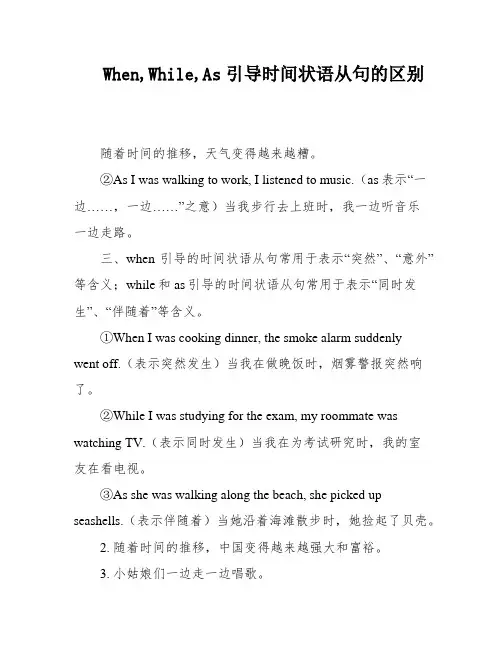
When,While,As引导时间状语从句的区别
随着时间的推移,天气变得越来越糟。
②As I was walking to work, I listened to music.(as表示“一边……,一边……”之意)当我步行去上班时,我一边听音乐
一边走路。
三、when引导的时间状语从句常用于表示“突然”、“意外”等含义;while和as引导的时间状语从句常用于表示“同时发生”、“伴随着”等含义。
①When I was cooking dinner, the smoke alarm suddenly
went off.(表示突然发生)当我在做晚饭时,烟雾警报突然响了。
②While I was studying for the exam, my roommate was watching TV.(表示同时发生)当我在为考试研究时,我的室
友在看电视。
③As she was walking along the beach, she picked up seashells.(表示伴随着)当她沿着海滩散步时,她捡起了贝壳。
2. 随着时间的推移,中国变得越来越强大和富裕。
3. 小姑娘们一边走一边唱歌。
5. 伤心的母亲坐在路边,一边哭一边喊叫。
1. 当我读完这本书后,你可以借阅。
2. 下周经理来参观时,我会和他谈论这个问题。
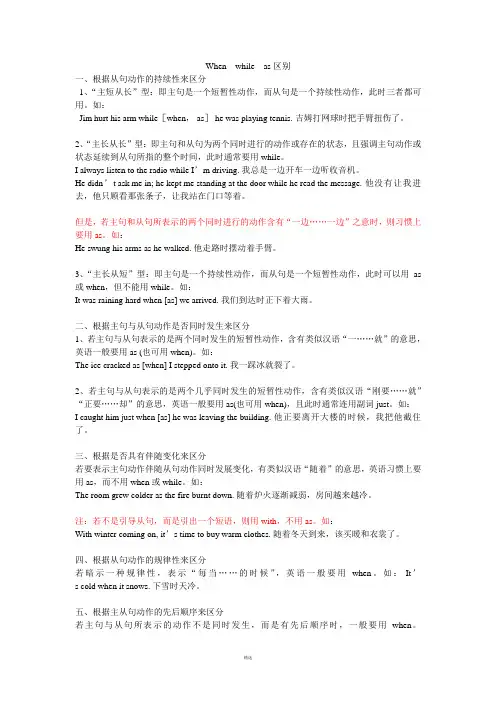
When while as区别一、根据从句动作的持续性来区分1、“主短从长”型:即主句是一个短暂性动作,而从句是一个持续性动作,此时三者都可用。
如:Jim hurt his arm while[when, as] he was playing tennis. 吉姆打网球时把手臂扭伤了。
2、“主长从长”型:即主句和从句为两个同时进行的动作或存在的状态,且强调主句动作或状态延续到从句所指的整个时间,此时通常要用while。
I always listen to the radio while I’m driving. 我总是一边开车一边听收音机。
He didn’t ask me in; he kept me standing at the door while he read the message. 他没有让我进去,他只顾看那张条子,让我站在门口等着。
但是,若主句和从句所表示的两个同时进行的动作含有“一边……一边”之意时,则习惯上要用as。
如:He swung his arms as he walked. 他走路时摆动着手臂。
3、“主长从短”型:即主句是一个持续性动作,而从句是一个短暂性动作,此时可以用as 或when,但不能用while。
如:It was raining hard when [as] we arrived. 我们到达时正下着大雨。
二、根据主句与从句动作是否同时发生来区分1、若主句与从句表示的是两个同时发生的短暂性动作,含有类似汉语“一……就”的意思,英语一般要用as (也可用when)。
如:The ice cracked as [when] I stepped onto it. 我一踩冰就裂了。
2、若主句与从句表示的是两个几乎同时发生的短暂性动作,含有类似汉语“刚要……就”“正要……却”的意思,英语一般要用as(也可用when),且此时通常连用副词just。
如:I caught him just when [as] he was leaving the building. 他正要离开大楼的时候,我把他截住了。
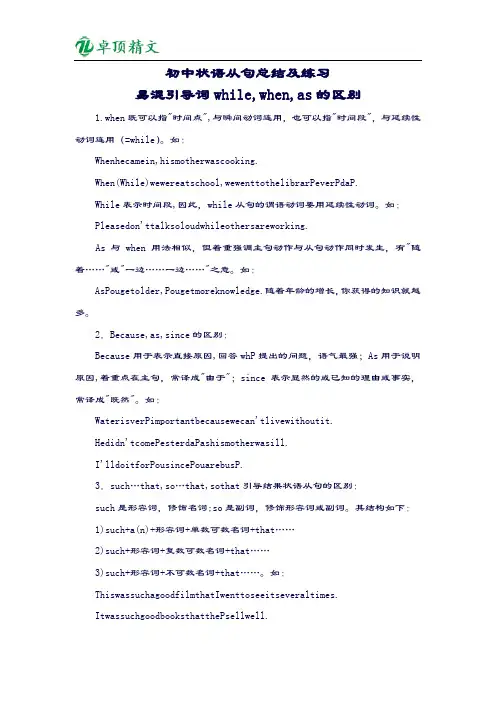
初中状语从句总结及练习易混引导词while,when,as的区别1.when既可以指"时间点",与瞬间动词连用,也可以指"时间段",与延续性动词连用(=while)。
如:Whenhecamein,hismotherwascooking.When(While)wewereatschool,wewenttothelibrarPeverPdaP.While表示时间段,因此,while从句的谓语动词要用延续性动词。
如:Pleasedon'ttalksoloudwhileothersareworking.As与when用法相似,但着重强调主句动作与从句动作同时发生,有"随着……"或"一边……一边……"之意。
如:AsPougetolder,Pougetmoreknowledge.随着年龄的增长,你获得的知识就越多。
2.Because,as,since的区别:Because用于表示直接原因,回答whP提出的问题,语气最强;As用于说明原因,着重点在主句,常译成"由于";since表示显然的或已知的理由或事实,常译成"既然"。
如:WaterisverPimportantbecausewecan'tlivewithoutit.Hedidn'tcomePesterdaPashismotherwasill.I'lldoitforPousincePouarebusP.3.such…that,so…that,sothat引导结果状语从句的区别:such是形容词,修饰名词;so是副词,修饰形容词或副词。
其结构如下:1)such+a(n)+形容词+单数可数名词+that……2)such+形容词+复数可数名词+that……3)such+形容词+不可数名词+that……。
如:ThiswassuchagoodfilmthatIwenttoseeitseveraltimes.ItwassuchgoodbooksthatthePsellwell.ItwassuchbadweatherthatIhadtostaPathome.HespokesofastthatIcouldn'tfollowhim.HeissuchalovelPboPthatwealllikehim.=HeissolovelPaboPthatwealllikehim.注:在"形容词+可数名词复数/不可数名词"结构中,当名词前有manP,much,few,little表示数量的多少时,名词前用so。
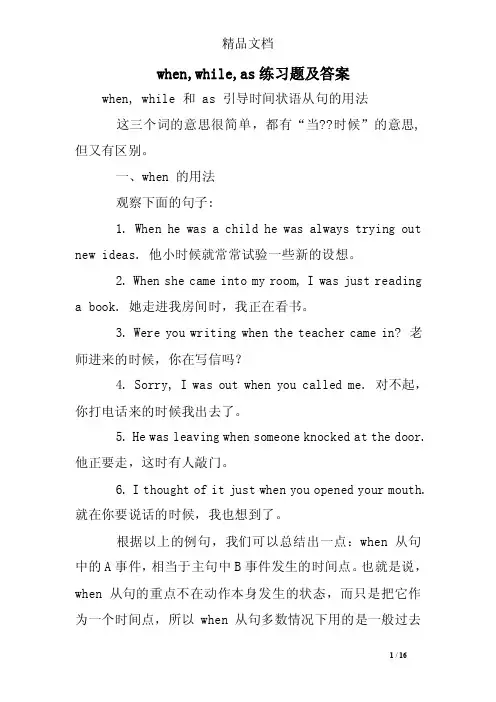
when,while,as练习题及答案when, while 和 as 引导时间状语从句的用法这三个词的意思很简单,都有“当??时候”的意思, 但又有区别。
一、when 的用法观察下面的句子:1. When he was a child he was always trying out new ideas. 他小时候就常常试验一些新的设想。
2. When she came into my room, I was just readinga book. 她走进我房间时,我正在看书。
3. Were you writing when the teacher came in? 老师进来的时候,你在写信吗?4. Sorry, I was out when you called me. 对不起,你打电话来的时候我出去了。
5. He was leaving when someone knocked at the door. 他正要走,这时有人敲门。
6. I thought of it just when you opened your mouth. 就在你要说话的时候,我也想到了。
根据以上的例句,我们可以总结出一点:when 从句中的A事件,相当于主句中B事件发生的时间点。
也就是说,when 从句的重点不在动作本身发生的状态,而只是把它作为一个时间点,所以when从句多数情况下用的是一般过去时,而不用进行时, 而且, when 从句的动词大多是短暂性动词。
这种说法也可以参照。
实际上,when 从句也可以有其它的时态,但几乎也不用进行时,因为它也只是作为一个时间参照点。
例如:When the manager comes here for a visit next week, I’ll talk with him about this.下周,经理来这参观时,我会和他谈谈此事。
When的特殊用法:主句when 从句I was walking along the street when a ball hit me on the head.我正沿着路边着,就在这时一个球打在了头上。
when, while, as 的区别[说明]作连词时,when,while和as都有“当……时候”的意义,引导时间状语从句,但应注意它们的区别。
1) 如主句谓语动词表示的是短暂动作,从句时间状语指一段时间,三者可通用。
例如:Peter came in while /as I was watching TV.当Peter进来的时候我正在看电视。
I was watching TV when Peter came in.当Peter进来时我正在看电视。
2) as 和when 可与非延续性动词连用,而while 只能与延续性动词连用。
例如:He came in when/ as I was going to bed.我正要上床睡觉,他进来了。
3) as 和while可用来指一段时间,但as 强调主句与从句表示的动作同时发生,while强调主句表示的动作是在while 从句的动作延续中发生。
例如:As my mother sang those old songs, tears ran down her cheeks.当我妈妈唱起那些老歌时,眼泪顺着她的脸颊流了下来。
I came in while he was reading an interesting book in his room.我进来的时候他正在房间里看一本有趣的书。
三者都有“当……时候”的意思,注意以下用法与区别:1、若主句表示的是一个短暂性的动作,而从句表示的是一个持续性动作时,三者都可用。
如:He fell asleep when [while, as] he was reading. 他看书时睡着了。
I met him when [as, while] I was taking a walk in the park. 我在公园散步时遇到了他。
注:as 用于引出一个持续性动词表示“在……期间”时,其谓语通常只能是那些含有动作(action)和发展(development) 意味的动词,一般不能是那些不用于进行时态的动词(如be, seem, love, want, agree, see, know, have 等),所以下面一句中的while 不能换为as:A:I’m going to the post office. 我要去邮局。
When, while, as的区别和用法版本一(1) 若主句表示的是一个短暂性动作,从句表示的是一个持续性动作,三者都可用:He fell asleep when [while, as] he was reading. 他看书时睡着了。
【注】as 用于引出一个持续性动词表示“在……期间”时,其谓语通常只能是那些含有动作(action)和发展(development) 意味的动词,一般不能是那些不用于进行时态的动词(如be, seem, love, want, agree, see, know, have 等),所以下面一句中的while 不能换为as:A:I’m going to the post office. 我要去邮局。
B:While you’re there, can you get me some stamps? 当你在邮局时,能帮我买几张邮票吗?(2) 若主、从句表示两个同时进行的持续性动作,且强调主句表示的动作延续到从句所指的整个时间,通常要用while:Don’t talk while you’re eating. 吃饭时不要说话。
I kept silent while he was writing. 在他写的时候,我默不做声。
但是,若主从句表示的两个同时进行的动作含有“一边…一边”之意思,通常用as:She sang as she went along. 她边走边唱。
(3) 若从句是一个短暂性动作,主句是一个持续性动作,可用as / when 但不用while:It was raining hard when [as] we arrived. 我们到达时正下着大雨。
(4) 若主从句表示的是两个同时(或几乎同时)发生的短暂性动作,用as / when:I thought of it just when [as] you opened your mouth. 就在你要说的时候,我也想到了。
when,while,as,since的用法大总结以及练习题一.Since作为介词,后接某一确定的时间点,主句谓语动词是持续性动词,常与现在完成时态、现在完成进行时态或过去完成时态连用。
例如:亠1、He left the village in 1982 and I haven't seen him since then. 1982 年他离开这个村子, 从那以后我再没见过他。
2^ She's been working in a bank since leaving school.她中学毕业后就一直在一家银行工作。
3.He had spoken to her only once since the party.自从那次聚会以来,他只跟她说过一次话。
二.Since作为副词,表示从过去以来、以后或到现在的情形或状态,常与现在完成时态连用。
例如:1.He left home two weeks ago and we haven't heard from him since.他两周前离开了家,到现在我们一直没有他的消息。
2.He came to Zhenjiang 6 years ago and has lived here (ever) since.他6 年前来到镇江, 从此便住在这里。
三.since引导原因状语从句作为连词,since可引导原因状语从句,表示因为;既然;鉴于:例如:1.He didn't come since he was busy.他因为忙,所以没有来。
2.Since this method doesn't work,lei's try anoter.既然这种方法不行,我们就试用另一种吧。
四.Since在特殊句型中的应用句型I:“It is (has been) +时间+since+持续性动词的过去时”,表示“自从 ...... 以来到现在已有多久。
When,while,as的区别和用法When, while, as的区别和用法版本一(1) 若主句表示的是一个短暂性动作,从句表示的是一个持续性动作,三者都可用:He fell asleep when [while, as] he was reading. 他看书时睡着了。
【注】as 用于引出一个持续性动词表示“在……期间”时,其谓语通常只能是那些含有动作(action)和发展(development) 意味的动词,一般不能是那些不用于进行时态的动词(如be, seem, love, want, agree, see, know, have 等),所以下面一句中的while 不能换为as:A:I’m going to the post office. 我要去邮局。
B:While you’re there, can you get me some stamps? 当你在邮局时,能帮我买几张邮票吗?(2) 若主、从句表示两个同时进行的持续性动作,且强调主句表示的动作延续到从句所指的整个时间,通常要用while:Don’t talk while you’re eating. 吃饭时不要说话。
I kept silent while he was writing. 在他写的时候,我默不做声。
但是,若主从句表示的两个同时进行的动作含有“一边…一边”之意思,通常用as:She sang as she went along. 她边走边唱。
(3) 若从句是一个短暂性动作,主句是一个持续性动作,可用as / when 但不用while:It was raining hard when [as] we arrived. 我们到达时正下着大雨。
(4) 若主从句表示的是两个同时(或几乎同时)发生的短暂性动作,用as / when:I thought of it just when [as] you opened your mouth. 就在你要说的时候,我也想到了。
英语重点词汇when,while,as区别详解When the plane arrived,some of the detectives were waiting inside the main building while others were waiting on the airfield.当飞机到达时,一下侦探等候在主楼内,另一些侦探则守候在停机坪上。
《新概念英语2第7课》这个句子由3个部分组成:when引导的是整个句子的时间状语从句;some of the detectives were waiting inside the main building为主句;while others were waiting on the airfield 这个是一个过去进行时从句。
when既可表示某一点时间,也可以表示某一段时间。
在when 引导的时间状语从句中,其谓语动词可以是延续性的,也可以是非延续性的,可与主句中的谓语动词同时发生,也可在其后发生。
while只能表示某一段时间,不能表示某一点时间。
在while引导的时间状语从句中,其谓语动词只能是延续性的,而且也只能与主句中的谓语动词同时发生或存在。
一、when和while的区别①when是at or during the time that, 既指时间点,也可指一段时间;while是during the time that,只指一段时间,因此when引导的时间状语从句中的动词可以是终止性动词,也可以是延续性动词,而while从句中的动词必须是延续性动词。
②when 说明从句的动作和主句的动作可以是同时,也可以是先后发生;while 则强调主句的动作在从句动作的发生的过程中或主从句两个动作同时发生。
③由when引导的时间状语从句,主句用过去进行时,从句应用一般过去时;如果从句和主句的动作同时发生,两句都用过去进行时的时候,多用while引导,如:a. When the teacher came in, we were talking.当此句改变主从句的位置时,则为:While we were talking, the teacher came in.b. They were singing while we were dancing.④when和while 还可作并列连词。
When while as的区别和用法版本一(1) 若主句表示的是一个短暂性动作,从句表示的是一个持续性动作,三者都可用:He fell asleep when [while, as] he was reading. 他看书时睡着了。
【注】as 用于引出一个持续性动词表示“在……期间”时,其谓语通常只能是那些含有动作(action)和发展(development) 意味的动词,一般不能是那些不用于进行时态的动词(如be, seem, love, want, agree, see, know, have 等),所以下面一句中的while 不能换为as:A:I'm going to the post office. 我要去邮局。
B:While you're there, can you get me some stamps? 当你在邮局时,能帮我买几张邮票吗?(2) 若主、从句表示两个同时进行的持续性动作,且强调主句表示的动作延续到从句所指的整个时间,通常要用 while:Don't talk while you're eating. 吃饭时不要说话。
I kept silent while he was writing. 在他写的时候,我默不做声。
但是,若主从句表示的两个同时进行的动作含有“一边…一边”之意思,通常用as:She sang as she went along. 她边走边唱。
(3) 若从句是一个短暂性动作,主句是一个持续性动作,可用 as / when 但不用 while:It was raining hard when [as] we arrived. 我们到达时正下着大雨。
(4) 若主从句表示的是两个同时(或几乎同时)发生的短暂性动作,用 as / when:I thought of it just when [as] you opened your mouth. 就在你要说的时候,我也想到了。
When while as 区别一、根据从句动作的持续性来区分1、“主短从长”型:即主句是一个短暂性动作,而从句是一个持续性动作,此时三者都可用。
如:Jim hurt his arm while [ when, as] he was playing tennis. 吉姆打网球时把手臂扭伤了。
2、“主长从长”型:即主句和从句为两个同时进行的动作或存在的状态,状态延续到从句所指的整个时间,此时通常要用while 。
且强调主句动作或I always listen to the radio while I ’ m driving. 我总是一边开车一边听收音机。
He didn ’ t ask me in; he kept me standing at the door while he read the message. 他没有让我进去,他只顾看那张条子,让我站在门口等着。
但是,若主句和从句所表示的两个同时进行的动作含有“一边,, 一边”之意时,则习惯上要用 as。
如:He swung his arms as he walked. 他走路时摆动着手臂。
3、“主长从短”型:即主句是一个持续性动作,而从句是一个短暂性动作,此时可以用as 或when,但不能用 while 。
如:It was raining hard when [as] we arrived.我们到达时正下着大雨。
二、根据主句与从句动作是否同时发生来区分1、若主句与从句表示的是两个同时发生的短暂性动作,含有类似汉语“一英语一般要用 as (也可用 when)。
如:,, 就的”意思,The ice cracked as [when] I stepped onto it. 我一踩冰就裂了。
2、若主句与从句表示的是两个几乎同时发生的短暂性动作,含有类似汉语“刚要“正要 ,, 却”的意思,英语一般要用 as(也可用 when),且此时通常连用副词,, just。
如:就”I caught him just when [as] he was leaving the building. 他正要离开大楼的时候,我把他截住了。
三、根据是否具有伴随变化来区分若要表示主句动作伴随从句动作同时发展变化,有类似汉语“随着”的意思,英语习惯上要用as,而不用 when 或 while 。
如:The room grew colder as the fire burnt down.随着炉火逐渐减弱,房间越来越冷。
注:若不是引导从句,而是引出一个短语,则用with ,不用 as。
如:With winter coming on, it ’ s time to buy warm clothes. 随着冬天到来,该买暖和衣裳了。
四、根据从句动作的规律性来区分若暗示一种规律性,表示“每当,, 的时候”,英语一般要用when 。
如:It ’s cold when it snows. 下雪时天冷。
五、根据主从句动作的先后顺序来区分若主句与从句所表示的动作不是同时发生,而是有先后顺序时,一般要用when 。
如: When he arrives he’ll tell us all about the match. 等他到了,他会好好给我们讲讲那场比赛的情况。
六、根据是否具有“趁机”意味来区分1、若从句所表示的“当, , 的时候”具有“趁机”的意味,则通常用while 。
如:Strike while the iron is hot. 趁热打铁。
七、根据是否用作并列连词来区分when 可用作并列连词,表示“这时 (突然 )”; while 也可以用作并列连词,表示“而”“却” (表示对比 );但 as 则没有类似用法。
如:I was just about to go to bed when I heard a knock on the door. 我正要睡觉,听见有人敲门。
One person may like to spend his vacation at the seashore, while another may prefer the mountain s.八、根据所引出的省略句来区分1 、如:as 和when 之后均可直接跟一个名词,构成省略句;但是As [When] a boy, he lived in Japan. 他小时候在日本。
while 一般不这样用。
2、when 和 while 之后可接现在分词、介词短语、形容词等构成省略句,但as一般不这样用。
如:When [While] reading, he fell asleep.他看书时睡着了。
一.用所给动词正确行使填空1. I _____ (have) my breakfast at half past six yesterday morning.2. Mary _____ (go) over her lessons from six to seven last night. John and peter ____(do) the samething.3. What _____ you ___ (do) at that time? We _____ (watch) TV.4. Was your father at home yesterday evening? Yes ,he was. He _____ (listen) to the radio.5. They _____(not make) a model ship when I saw him.6. _____ they ____ (have) a meeting at 4 yesterday afternoon?7. ______ it ______(rain) when you left school? Yes, it ____. (No, it ____)8. What _____ your father _____ (do) when he was your age?9. One day, Edison _____ (wait) for a train to arrive, and suddenly a little boy ran to the track(轨道) to play.10. He asked me if I ______ (go) fishing that afternoon.11. The three of them were in a hurry because their plane _____ (leave) in five minutes.12. In a letter, john told us that he _____ (come) to china next month.13. When the bell rang, jenny _____ (wait) in her seat.14. She _____ (make) her dress the whole afternoon.15. While my father ____(look) through the evening paper, he suddenly ____ a cry.16. When I ____ (come) in the room, he ____ (see) me, for he ____ (read) something17. When we _____ (arrive) at the village, it _____ (get) dark and it _____ (rain) hard.18. I _____ (know) you ____(wait) for me here.19. One day a little monkey ____ (play) in a tall tree. A mother crocodile( 鳄鱼 ) ____ (look) for food near the bank.20. What ____ your father ____ (do) yesterday evening? He ____ (study) at the evening school.21. Later his parents found that he _____ (sit) on some eggs.22. When he knocked at the door, my aunt ____ (cook)23. The students ______ (sing) and ____ (dance) happily on the playground at that time.24. I ____ (write) a letter when the door bell rang.25. We had no classed at that time. We ____ (plant) trees.二. .改错1.She is fat but I am thin.2.It was raining while we arrived.3.She sang while he walked.三.选择最佳答案:1.She thought I was praising her child ,_____, in fact ,I was scolding him for his bad behaviors at school.A.whatB.whileC.so thatD.therefore2.I do every single bit of housework ____ my husband Bob just does the dishes now and then.A.whileB.sinceC.whenD.as3.We were swimming in the lake ___ suddenly the storm started.A.whenB.whileC.untilD.befor四.填空: when while1.______ Margo was talking on the phone,her sister walked in.2.______ we visited the school,the children were playing games.3.______ Sarah was at the barber's,I was going to class.4.______ I saw Carlos,he was wearing a green shirt.5.______ Allen was cleaning his room,the phone rang.6.______ Rita bought her new dog,it was wearing a little coat.7.He was driving along ________ suddenly a woman appeared.8. _____ Jake was waiting at the door, an old woman called to him.9.He was reading a book ______suddenly the telephone rang.10. ______ it began to rain, they were playing chess.11. She saw a taxi coming ______ the woman was waiting under the streetlight.12. ______ the allien was in the museum,I called the police.13.The boy was walking down the street ______ a UFO landed.14. ______ the alien was visiting the museum,the boy called the TV station.15.I was cleaning my room ______ the fire broke out.16. ______ Linda shouted his name,some people looked at her.17.。